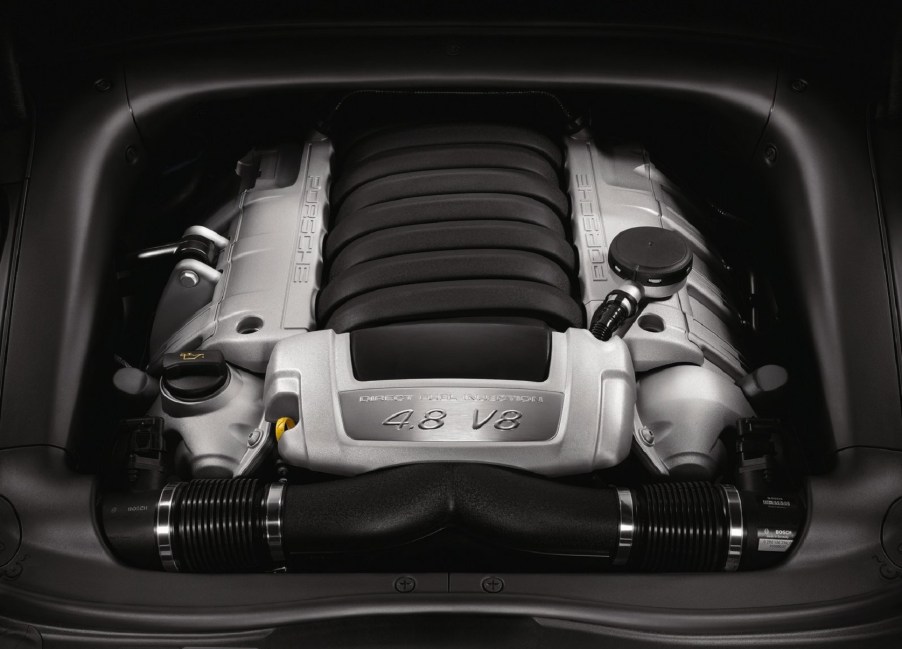
Which Used Porsche Engines Are the Most Reliable?
Depreciation means buying a used Porsche can be tantalizingly affordable. That is, until the repair bill comes in, because, used or not, a Porsche is still a luxury vehicle. However, whether you’re talking 911 or Cayenne, the German brand’s modern cars are more reliable than some may realize. Especially when it comes to their powertrains.
Please note, the Porsche engines described below are limited to those installed in cars made within the last 25 years. That’s because, after that point, cars stop being ‘used’ and turn into ‘classics.’ And while classic cars can be durable, they’re not necessarily as reliable as modern ones.
For a used Porsche Cayenne, look for the 4.8-liter V8 or VR6 engine

While an improperly-cared-for used Porsche Cayenne can be a money pit, the SUV/crossover is stouter than you may think. And while some of its engines had their flaws, that’s not true of every Cayenne powertrain.
The first-gen Porsche Cayenne offered two different engines: a 4.5-liter V8 and a VW-derived 3.2-liter VR6, Automobile reports. That V8, the ‘M48’ V8, is naturally-aspirated in the S and turbocharged on the Cayenne Turbo. And unfortunately, pre-2007 Cayenne S models have a reputation for scoring their cylinder walls because their ‘Lokasil’ coating fails, Revolution Porsche and Evo explain.

However, Porsche rectified this in 2008 with the ‘M4801’ 4.8-liter V8 engine. This engine has a different cylinder lining and block that doesn’t suffer the scoring issue, FCP Euro reports. And overall, it’s a reliable Porsche engine, with the only remaining issue being old plastic coolant pipes cracking, CarThrottle reports. Fortunately, more durable metal replacements are available, PCar Wise reports.
2008 also saw the Porsche Cayenne trade in its 3.2-liter VR6 engine for a 3.6-liter one. And while the VR6 has its foibles, with modern parts it’s a robust and reliable powerplant. Plus, Motor Reviewer reports that the 3.6-liter VR6 doesn’t seem to suffer the same ignition-coil issues, or at least not as frequently, CarThrottle reports. The only issue is PCV valve failure, PCar Wise reports, which is an age-related problem.
If you can’t find a used first-gen Porsche Cayenne, there’s always the 2011-2018 second-gen model. It has the same powertrains, joined later by a 3.6-liter twin-turbocharged V6. And overall, they’re just as if not more reliable, PistonHeads and FCP Euro report. Though admittedly, some 2011 models were recalled for faulty camshaft bolts, Cars.com reports. And the second-gen V8 engines are part of an ongoing class-action lawsuit regarding coolant pipe epoxy failure, though it appears to have been a supplier issue, CarComplaints reports.
Used Porsche Boxster, Cayman, and 911: avoiding the IMS and other issues

In discussing used Porsche reliability, one acronym continually crops up: IMS. The IMS bearing is one reason why many Porsche fans revile the 996-gen 911. And the part’s problems also crop up in the contemporary Boxster and Cayman, along with early versions of the 997-gen 911.
It’s worth pointing out that, while an IMS bearing failure can mean engine death, complete failure is not necessarily common. PCar Wise reports that “less than 5%” of Boxsters have actually experienced IMS failure or IMS-related engine failure. That’s especially the case with the 2005-2008 ‘987’ Boxster and Cayman, which have stronger IMS bearings, Revolution Porsche and Motorious report.
However, it’s worth pointing out that early 997-gen 911s and 987-gen Boxsters and Caymans do have other flaws. Much like the first-gen Porsche Cayenne S, the cylinders in these cars’ engines can get scratched and damaged, Revolution Porsche and RPM Specialist Cars report.
Luckily, there are several ways around this. Firstly, the engines in the 996 Turbo and 996 GT3 don’t have the IMS bearing. And secondly, while 997.1- and 987.1-gen cars have the IMS bearing and cylinder-scoring problem, 997.2- and 987.2-gen have neither, Grassroots Motorsports reports. In model-year terms, that means 2009-and-later Porsche 911s, Caymans, and Boxsters have more-reliable engines. And the only real issue left is a potential rear main seal oil leak, RPM Specialist Cars reports.
For 993s, reliability means going turbo or upgrading the valve guides
The last of the air-cooled Porsche 911s, the 993-gen cars, just squeak by the 25-year limit we imposed here. And given their desirability, it’s understandable that many would want to own one. But while the 993-gen 911 is “generally reliable,” Car and Driver reports, it’s both getting older and not necessarily fault-proof.
While some oil consumption isn’t a problem, oil leaks are, Revolution Porsche and Elferspot report. Also, starting in 1996 the 993-gen 911 came with secondary air injection to pass emissions regulations. While that’s not a problem in and of itself, once the valve guides start to wear, carbon clogs the injection ports, PCA explains. Plus, the original wiring harnesses used soy-based covers, which sometimes attracted rats.
Luckily, a 993-gen Porsche 911 can still have a reliable engine. For one, modern valve guides use longer-lasting material. And if you’re really worried, PCA reports the 993 Turbo has different, more durable valve guides.
Follow more updates from MotorBiscuit on our Facebook page.


